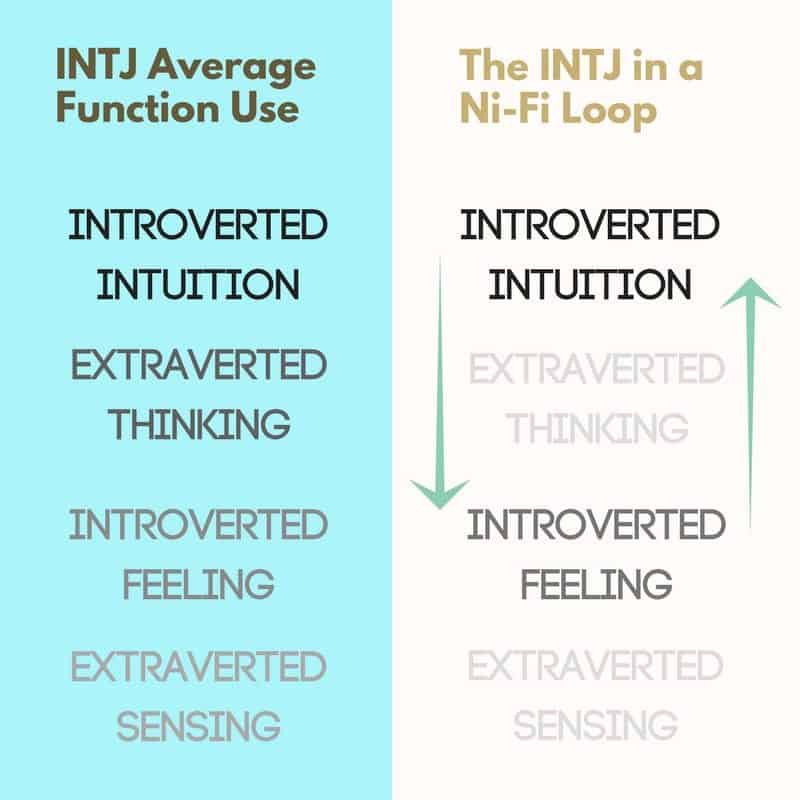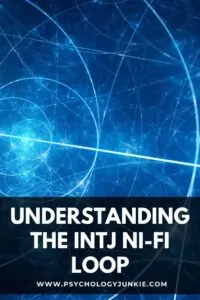The INTJ Ni-Fi Loop
What is a Ni-Fi loop? And how does it affect you as an INTJ? Today we’re going to unpack this unique phenomenon and try to demystify it so that it’s easy to understand.
Do you ever feel like there’s a part of you that doesn’t match type descriptions? A lot of INTJ descriptions make out the type to be very cold, aloof, and unfeeling. This can be surprising to many INTJs who actually feel very in touch with their feelings, values, and emotions.

INTJs are much more nuanced than most type descriptions would imply. Rather than being the cold-hearted rationals that most stereotypes paint them as, they are actually quite reflective, thoughtful, and even ethical. INTJs going through a “loop” may not seem like your typical INTJ. They may also be struggling with a lot of confusion and frustration in their day to day life.
To understand the INTJ loop we need to look first at the INTJ cognitive function stack.
Not sure what your personality type is? Take our new personality questionnaire here. Or you can take the official MBTI® here.
Table of contents
Estimated reading time: 8 minutes

The graphic above shows us the INTJ’s cognitive functions. These functions are like mental tools that you can wield with various levels of strength and proficiency. As you can see in the graphic above, an average INTJ will have a strong use of Introverted Intuition, followed by Extraverted Thinking, Introverted Feeling, and Extraverted Sensing. In the graphic, you can see that the influence of each function becomes lessened as you move down the function stack.
Your cognitive functions have different names: Dominant (1st), Auxiliary (2nd), Tertiary (3rd), and Inferior (4th).
The Cognitive Function Hierarchy
The dominant function feels like oxygen that you breathe without trying. It takes almost no energy to tap into, and you feel certain and sure of yourself when you’re using it.
The auxiliary function supports the dominant function. It helps you to have balance, a sense of perspective, a supportive, grounded outlook. It’s not as easy to use as the dominant, but it’s still fairly simple to tap into. It doesn’t take a lot of concerted effort to feel connected to the auxiliary function.
Next, we have the tertiary function. This function is playful, vulnerable, and childlike. It feels natural to use, but it’s also a function that isn’t as effective as the dominant or auxiliary functions. We make more blunders here and may feel especially vulnerable to criticisms here.
The inferior function, at the bottom of the stack, feels exhausting to use. You feel very uncertain of your conclusions when you’re tapped into the inferior.
The Ni-Fi Looping Process
When an INTJ is looping, they have diminished use of their auxiliary thinking function. In fact, they bypass thinking and go straight to feeling. Then they loop back up to intuition, then back to feeling, over and over again. This is not a healthy state for the INTJ to be in and usually results in imbalanced decision-making, irrational fantasies, and loss of focus.
Introverted Intuition (Ni)
Introverted intuition is an ability to understand how the world works through internal analysis, insight, abstract thought, and symbolism. Ni users have the ability to easily spot patterns and trends that will lead to a future outcome. They get strong hunches and “gut” feelings out of nowhere that are related to an unconscious synthesis of sensory data.
Introverted Feeling (Fi)
The ability to deeply understand one’s own emotions and values. Fi users have a strong moral compass and believe in being authentic and true to themselves and their identity.
Introverted Feeling in the INTJ
For the young INTJ, introverted feeling is often erratic and unpredictable. It’s not nearly as comfortable for them to use as intuition and thinking. They may repress negative emotions one day and then dwell on them the next. One week they may be hypersensitive to criticism, and the next week they may be able to take criticism in stride. The tertiary function can at times be very proficient and at other times be very inept. Through life experience, maturity, and determination the INTJ normally develops more balanced use of the tertiary function in mid-life.
The Importance of Extraverted Thinking
Extraverted Thinking (Te) is what balances the INTJ’s dominant function, Introverted Intuition (Ni). Te takes all the insights, projections, and ideas of intuition and puts them into workable plans. It stays focused on objective logic, efficient decision-making, and putting plans out into the external world. Te works in tandem with Ni to make the INTJ strategic, planful, objective, organized, and decisive. When INTJs bypass Te they become lost in an unproductive state, withdrawn from the outer world and disinterested in making any difference in their environment.
Reasons INTJs Loop:
– As a defense mechanism.
The INTJ is defending themselves from the outer world and outer pressures by secluding themselves in their introverted functions.
– As a result of environmental imbalance
The INTJ has not been given sufficient opportunities to use the auxiliary function, and thus stays in a continual state of seclusion and focus on their introverted functions.
– The auxiliary function isn’t valued
If the INTJ favors the internal world to such an extensive degree that they don’t even try to develop their auxiliary function or get out into the world, they can loop.
What the INTJ Loop Looks Like
INTJs experiencing a Ni-Fi loop can get stuck in a world of theoretical visions compounded by subjective, emotional reactions. They are often called “conspiracy theorists” when this happens. They become suspicious of other people and the world at large. Fi feeds the INTJ emotion-based suspicious, and Ni will go to any lengths to justify those suspicions.
As an example, an INTJ in a loop could imagine that her friend doesn’t like her. Fi and Ni work together to make an emotional judgment that the friend dislikes her after the friend seems distracted and keeps excusing herself at a party. The same friend keeps canceling plans and showing up late to meetings with her. However, if Te and Se had been in the picture and functioning properly, Te would have been working with Ni, Fi and Se to see that
A) The friend’s distraction is a result of tiredness (the friend has morning sickness, is anxious about pregnancy)
B) The friend is canceling plans and showing up late because she’s feeling sick. Maybe friend needs some help or reassurance.
The above example may be kind of extreme, but it gets the point across. Fi feeds Ni feeling-based reactions and suspicions, and Ni fills in the gaps with any perceptions that might solidify those Fi-based suspicions. Ni doesn’t see the details (the friend has morning sickness, the friend has dark circles under her eyes, the friend isn’t eating normally). Ni just sees an impression (friend is gloomy, distracted, and mysteriously absent). Te and Se are left out in the cold and ignored and repressed so that Ni and Fi can continue feeding each other illogical fantasies and beliefs.
The Ni-Fi loop can also manifest when an INTJ comes up with rules or edicts that they enforce to everyone else. Their feeling-based values become “facts” and everyone must obey/adhere to them.
Other Ni-Fi loop traits: self-centeredness, insecurity, irrational behavior, preoccupation with a “vision” or idea of what is “really” happening, uncertainty, repeated grip stress reactions.
How INTJs Can Get Out of a Loop:
The first step to getting out of a loop is recognizing that you are actually experiencing a loop. This can be difficult initially because the dominant-tertiary loop can feel comfortable. It can seem natural because you’re still using two of your primary functions and in your preferred introverted direction.
Whatever you do, don’t go to Extraverted Sensing (Se) to solve the problem. Many INTJs do this, but switching to the inferior function can push you into the grip instead of a healthy functioning state. Going to Se to get out of a loop can cause you to become indulgent, impulsive, and overly focused on sensory experiences in an unhealthy way. To get out of a loop, your best option is to focus on your auxiliary Extraverted Thinking (Te).
Ways to Re-Awaken Te:
Talk over your state with someone else and ask them if your projections make logical sense. Sometimes just saying your thoughts out loud (extraverting them) can help you to see what you might be missing or what logical missteps you’ve taken. Use Te to make a difference in the outer world. Structure and organize your day. Focus on attainable, logical goals and make a roadmap for how you will reach them. Play chess or another strategy game. Do things that force you to use logical, objective thought in an externalized way. Talk to people, work out plans, write out your plans, record yourself speaking through your ideas and visions and then listen to yourself and decide if what you’ve said makes sense. Just try to activate Te and re-introduce it into your daily life. As you do this you will start to get out of the loop and enjoy a more balanced, healthy, pro-active state.
What Are Your Thoughts?
Have you ever been in a loop? Do you have any suggestions for getting out of one? Let us know in the comments!
Find out more about your personality type in our eBooks, The INTJ – Understanding the Strategist, Discovering You: Unlocking the Power of Personality Type or The INFJ – Understanding the Mystic. You can also connect with me via Facebook, Instagram, or Twitter!
Other Posts You Might Enjoy!
How You Use Extraverted Thinking – Based On Its Location in Your Function Stack
The Childhood Struggles of INTJs
References:
Understanding Yourself and Others® An Introduction to the Personality Type Code by Linda V. Berens and Dario Nardi (InterStrength, 2004)
Building Blocks of Personality Type by Leona Haas and Mark Hunziker (Eltanin Publishing, 2014)
Personality Hacker by Joel Mark Witt and Antonia Dodge (Ulysses Press, 2018)











Thank you for this entry. I’m an INTJ, and I recognize the loop and find it very useful to read how you suggest to get out of the loop. It works :-).
Thank you! I’m really glad you found this useful!
Thanks a lot Susan for this lovely write up. You have a deep understanding of the Ni-Fi loop. I can attest it as someone – going / having recently been – through this phase. IT SUCKS!!
Anyways, thanks a lot once again. 🙂
PS: I wish you could elaborate a little more on the CURE, is how to get out of this loop. Please.
Thank you for reading it! Loops are NEVER fun, I know! I am still learning more about them, and will definitely elaborate on them more as I find out more information!
This is great information Susan. Thank you! Apparently I was just in a loop. In the midst of it I talked with 2 important people in my situation to confirm my sense, then wrote a letter to the ultimate person concerned, wrote in my diary about the situation, started to reflect on my purpose in life and how to give value to others, made a plan. Am currently executing one of the items in this plan. So, I actually did what was right. Whew!
No wonder I went from panic to peacefulness.
Barnum effect or I am in a very long loop…
THANK YOU. This Ni-Fi loop describes EXACTLY what I’ve been experiencing. Word for word. It’s been such an intense, bizarre experience that I’ve even questioned if I’m actually an INTJ (obessive-compulsively testing/restesting myself, others see me as an INFP). Now, everything makes sense and I can solve this problem. Very relieved.
One reason for a is that IN THE fear being too direct and pushy to others (Te).
Hi spectacular article. But I am confused whether I have brain fog or the loop.Are there any similarities between them?.And please suggest some more ways to get out of the loop.
I have experienced this loop. This article is well written and would be very useful in getting out of the Ni-Fi loop. In my 37 years, I have figured out how to get out of it on my own. This article would have been very helpful in my younger years!
Excellent article. I have always been a fairly balanced INTJ female, but I am so appreciative of the information because it helps me to understand the cognitive stack. I have a young niece who is INTJ and often stuck in the loop. This is a tremendous help for understanding and guiding her. Thank you!
I disagree, as an Intj with a strong fi I actually find it to be more useful. I am able to think rationally but at the same time understand irrational behavior. I know it is normal for intj types to be caught off guard by irrational/emotional actions and judgements but I don’t personally have that issue. For the most part I appear pure intj because I have a habbit of disregarding personal opinions of both myself and others for the benefit of the whole. But I always watch the people who could curtail progress with their own vision of a belief based system rather than one that actually works. Also it comes in handy when handling social conflicts, I am not social myself but I am also not afraid of the spot light…. intervening when necessary to get people back on track. I do not believe there are only flaws in having a strong fi , there are many strengths as well.
I’m still not sure if I’m INTJ or ISTJ, but I recognize much of this.
What is the time period these loops last?
I have some trouble converting this into words,, but i’ll try:
I think I was more INTJ-like when I was younger (I’m just under 30 now), but as school and especially work has entered, I seem more like an ISTJ. Can stress be a cause of this, does it fit with how it affects the types?
Sometimes, a few hours usually, I get sad and/or angry about something – often it seems like the emotion was there first, and I “address it to” something that I find morally wrong or that may have adverse effects in the future: people laughing at video clips of people getting hurt, upcoming laws that limit things I or those around me may want to be able to do in the future, things that unnecessarily harm the environment, etc. Sometimes even just an annoying song.
I think about one or more such things over and over again over the course of maybe half an hour to two hours, often accompanied by a feeling of hopelessness or an intense anger, then it’s gone. Often it disappears when I get to change tasks at work, talk to someone about something else, or get a new idea.
Sometimes I get the feeling that family members, co-workers etc. do everything in their might to piss me off, or even make me have a nervous breakdown. I usually don’t say it, although that has happened once or twice too. I normally know that they have other reasons, or complete lack of reasons, for doing what they do, and aren’t intentionally trying to annoy me, but right there and then it _really_ _seems_ _like_ _they_ _do_.
I’d love to know if it could be that I’m an INTJ who get caught in a loop, if something similar could exist for ISTJ:s, and in whichever case, what to do about it – or if this is completely unrelated.
Hi there! Actually, ISTJs and INTJs have similar loops. Only INTJs have a Ni-Fi loop and ISTJs have Si-Fi loop. When ISTJs enter a loop they would still have that Fi tone to it (values, morals, suspicious of other people’s values/morals/integrity). Because ISTJs lead with introverted sensing, their loop would be less about Ni filling in a kind of symbolic/unconscious explanation for Fi judgments, and would be more about Si filling in with personal experience and sense impressions. So “this person did this in the past, so they’re doing this now” or finding concrete details to believe something that Fi is telling you.
I haven’t yet had the time to read up much on the function stack and its theory, but the way out of loops, is it similar for INTJs and ISTJs? Obviously the first step is the same – recognizing it – but then?
Could be helpful to know if anything goes for both types, as I’m not sure which I am. I’m now fairly sure that this type of loop is what I’m experiencing, yet no closer to knowing which type I am, as the reasoning varies in nature and/or is ambiguous enough to fit both descriptions.
What amounts of time are usual for loops, are we normally talking minutes or months, and is it different between INTJs and ISTJs? What ends them, apart from actively trying to do so?
Thanks.
Yes, I definitely get stuck in loops. I go through periods (weeks, sometimes months) during which I feel that I have no friends. I isolate, I don’t respond to texts and invites. I am able to recognize it. Sometimes I intentionally stay in it because my writing tends to be better during this period. Other times I’m able to get out by reviewing the evidence of how much my friends care (texts and invites).
I have had problems with the Ni-Fi loop in the past, but I know how to deal with it now. I feel serene most of the time. I always use Ni+Te to think about conspiracies. It appears that very many of the conspiracy theorists are INTJs, but I think it has more to do with the fact that INTJs as a whole seem to to be the type that cares the most about objective truths and care the least about other peoples’ feelings. I think it has little to do with the Ni+Fi loop.
Thanks for te article
Thanks for reading! 🙂
I have definitely experienced these loops which have often lasted months or years. The Ni is a very dominant trait for me. I have had to learn to use the T to pull out of it, along with the J. I decide with stubborn determination that I’m not going to be depressed/sad/reclusive anymore. Then I use the T to review positive truths. God loves me, my family loves me, I have a lot to offer this world, and I’m still breathing so I can still make a difference. I review the truths (especially about God’s love for me, that’s the most stabilizing factor) over and over again, even writing them on my walls and mirrors so that I see the truth everywhere I look. So combination of the (T) thinking about the truth, and (J) determining that I WILL be happy and at peace is how I deal. But thank you for this article.I hope it helps younger readers. I wish I had known these things 15 years ago.
Hi Sarah! Thanks so much for your input on this! I’m so glad you’ve found some really effective ways to dealing with this! Especially about God loving you, that can get you through A LOT! Thanks for sharing 🙂
This is me! I’ve had many episodes of feeling that my friends don’t like me. I had no idea what was wrong with me, worried I might have some form of mental illness. What a relief to finally understand what is going on. If I get stuck in this loop again I will be using your suggestions of how to break free. Thank you for posting this.
Ni-Fi loops make one so stupid…
Last week, I was thirsty and bought a drink on the way home. I thought it tasted a bit odd, then I scrapped my finger (no blood) on a flaw on the bottle, little piece of sharp plastic…
My mind went : OML I just cought aids I know it, what if they put infected blood in the drink which is why it tastes weird… an infected worker had an accident, no, they have quality control, so an evil master mind who got a job at packaging these bottles… blah…
Flipped out for fifteen minutes on that before finaly paying attention to something logical that went “first of all…”
I have the impression that Ni and Fi are having a bat sh** cocus and that Te tries to hop in, like “NO, LET ME EXPLAIN HOW WRONG YOU ARE”.
Hah… Fun times…
Definetly experienced the Loop. My behaviour makes so much sense now. Thank you so much on publishing this article. This will help me in the future. Thank you.
I can say, it is the darkest experience you make if your very best friend hates you bc you were mistrustful.
You sink in a hole of guilt and self doubt.
I’m happy to know now, what’s happening, because I was working all the time on my surprising behaviour and emotions.
I never felt such intense feelings.
Thank You so much
I’m glad you enjoyed this!!
Thank you this helped me a lot a moment when I needed it. I’ve definitely been in this loop before over a friend… She just started ghosting me. To this day I still don’t know what happened, but it definitely put me in a loop. I’m currently in a loop now while figuring out if we should buy a new house. I did all the planning, got the preapproval, got a realtor, but then I am obsessing with looking at houses on Redfin. There are too many choices And parameters and I’m going into analysis paralysis and reverting to looping . It makes me feel crappy.
I have definitely been in this loop before. I always try to reach out to my Se. Which I now know that doing that is a bad idea (I knew it subconsciously but I just ignored it). Thanks for the article, it really helped 🙂
Amazing, great insights ! This article is really amazing. I am really stunned that any one can analyze things so deeply. Really great ! Keep it up.
I often schedule myself healthy activities considering each function. Fi I practice with journaling and contemplating my values. When I get in a loop, I might start cooking something with lots of steps to take. That way I can engage both Te and Se and get “out of my head” and doing something useful while at it. Other Te and Se activities are yoga, board games and other forms of exersice, bouldering being one of my favourites.
Sometimes I indulge in alcohol or become a hermit but I make sure to have a deadline when to get back to my regular rutine.
What an amazing article! I regularly experience such loops when in stress. It used to be ,much worse in my early 20s an when I suffer from depression. Actually, I have exhausted my psychologists in explaining them in detail and with sound logic why I am objectively right to feel worthless.
How did you get out of this depressive loop?
thank you for the information
I am in it since quite a while and I cannot stop judging myself. My Te is blocked & I cannot focus or conclude anything clearly; I feel ‘wishy washy’ and ‘stupid’ and it makes me despise myself. I am obsessed with my mental condition and fall ever deeper into self hatred. I cannot stand the way I behave because of that; it’s most shameful.
I feel like I am loosing my very self. But it’s validating to know that I am not imagining this & that it actually has a theoretical background.
same feeling, I feel disappointed of myself. I’m 25 years old and in don’t know what’s my goal, and what should i do on my life, i waste a lot of time.
It’s always a relief to read this article. Especially the intro who reassures me about INTJ not being all cold-rationnal beings. I think a lot of articles on or by INTJs are kind of extreme on how we are not supposed to be connected to Feelings. It’s more nuanced for me and as for others people i can read here. So thanks for that.
And on how the loop functions, i think it’s crucial information for me (us) to know and live a more healthy life. Knowledge is key.
Hello there! I have a question about the Ni-Fi loop. I’m an INFP and working on a story where an INTJ father’s much beloved and only son goes missing during a battle, and has been missing for a month. Everyone who has been sent out to find him has come back empty, and all captured enemy soldiers have honestly said they have no idea where he is. It is also extremely uncharacteristic of the son to disappear without a trace and become MIA.
Not only that, but the son’s mother died violently when he was just an infant, and his father loved his mother very, very, very much and still mourns her. His son is all he has left of her, and he loves him more than life itself. The father is also the general of the army his son fought in, and was in the same battle. His son went missing when he went to search for a fallen friend on the battlefield. His body has not been found, and the rest of the dead were accounted for, hence the MIA.
In the Ni-Fi loop in this scenario, how would the father/general respond? I sort of thought that he would just shut down, become reclusive, not lead his army, barely eat, barely sleep (and has nightmares), and the Ni would be imagining his son enduring all sorts of torture at the hands of the enemy that did retreat and was not captured, and that he would be crying in the confines of his own quarters as his fear over his son’s disappearance and the lack of answers (aka a problem he cannot solve).
And he would be blaming himself because he’s the general that led his son into the battle in the first place. He cannot think logically, which means he’s missing the fact that his son was captured but by a different enemy that used to be an ally, and thus does not think to go across that country’s borders to find and rescue him from a heavily-fortified prison in his Ni-Fi state.
Does this sound pretty accurate for an INTJ male caught in the Ni-Fi loop in such a scenario?
Thanks! This INFP writer really appreciates and looks forward to your answer! 😀
INTJ would probably over indulge. INTJ would seem to still be functioning as per normal but would be putting more of themselves into finding out what happened to their son. As they unravel they would become more reckless and more convinced in their own theories of what really happened. Often without consulting the facts. They absolutely would do something drastic if in a grip state. Which in this instance is more likely than coming back to Te. Although he could start using Te once he’s slipped into a grip state. An INTJ can only handle so much chaos.
I’m a 17 year old INTJ student from India and I definitely am experiencing this loop right now! I’ve gotten into studying about the MBTI types (beneath the surface of just “INTJ-The architect” or “ESFP-the Performer” and I must say I’m a newbie to learning about the cognitive functions) and while I always have felt I use Te profusely, it has often been in an immature or impulsive manner and its been months since i havent gotten my daily to-do list done and it frustrates the heck outta me, to an extent I almost decided im an INTP since INTJ’s are usually the more focused and productive bunch (Sorry if that sounds aggresively stereotypical) and I can relate to a lot in this-having the “oh I don’t care about others’ opinions” attitude only to become the “who are you to think of me like that?” attitude, it definitely is an Fi-Ni loop and I’m so glad to have come across this article since I finally know areas I need to work on. I don’t know if I’ve bene able to get my condition across clearly, but all I need you to know is that you’ve given me significant info for me to build on for self-growth, thank you for this.
soo.. i can’t tell if i’m actually an intj since i don’t care about doing things to be productive. i’d rather sit and do mostly nothing, just think and fantasize about mbti and other stuff. i think that if i am any type within the 16 i might be intj because of how i’ve gone about finding my type, asking questions and looking into all types and their states.. as well as having watched the 5 signs you’re not an intj video. i just feel like the world doesn’t agree with me? but even that might be me looping. it’s gotten so bad that i got psychosis, thinking i could hear other people’s thought and they could hear mine. so much negativity.. are you able to tell when you’ve escaped the loop? i guess i would be able to but haven’t yet because i’m so ”comfortable” with my ni fi projections (if that is what it is). anyways here goes my comment
You could be INTP, then you’re inferior function would be Fe – Fe has the ability to “know” what other people are thinking. So I would suggest Googling Fe grip experience.
Best of luck, try do one productive thing a day, and u’ll survive 💪 😉
your comment section doesn’t work. just tried commenting and loading other comments. is this site fake
Comments just have to be approved by me because we had an issue with people bullying each other in the comments or posting spammy links 🙂 Sometimes it takes me a little while to get to the comments to approve them! Thanks for your patience!
I think healthy integration of the Fi is more useful than using Te yes of immediate purpose Te might be helpful but to completely annihilate this state I think Fi should be integrated I am more of a Jungian than I think an unhealthy Anima when possesed then the INTJ experiences this Ni Fi loop because the Anima has two functions one is to tune the hero’s purpose with internal moral values and to make the unconcious concious the last two functions are always one observing and another dicision making in INTJ the Fi decides and Se observes the Anima tunes INTJ to his internal moral values guided by his predominant unconcious instincts and she makes the unconcious concious through the observing inferior function Se that’s why it is very needed to integrate the last two functions as Se is the face turned towards the unconcious .
I am an INTJ, and am experiencing this loop, and don’t know how to get out of it, I tried to speak to many people, I tried to simulate my problem, and find its solution, also I tried to find the cause of the problem, but nothing worked.
So I am experiencing very hard time, don’t know how to solve it, like I am cornered, whatever I think about, I can’t get anywhere, just like a failure.
Please anyone, HELP!
Brilliant! I didn’t know this was a “thing” but it’s what I’ve been going through all of my life. When I read that INTJ’s have to counteract the Ni-Fi loop with Te, I realized I’d come up with that strategy once I met some I really trusted in life – my husband. When I get into these funks where I’m just beating myself up over perceived slights, I go and ask my husband “is this normal?” or “what’s happening here?” and he really helps me talk it through.
For example, I recently had a little confrontation with a coworker who, unrelated to her work, criticized me for the way I handled a situation. Basically told her thanks for the feedback but I’ll continue to lean on my expertise and training but if she had more complaints to bring them to my boss. I thought I handled it pretty cool but ol Ni-Fi, as I just learned, started looping with all sorts of conspiracy theories like “what makes me such a target for bullies/narcissists?”, “why does she look so much like the bully who personally attacked me a few years ago?” and finally “did I really handle it that badly?” Whew, exhausting right? Thankfully my husband and other close colleagues helped snapped me out of it!
Thank you for the insightful articles!! 💓